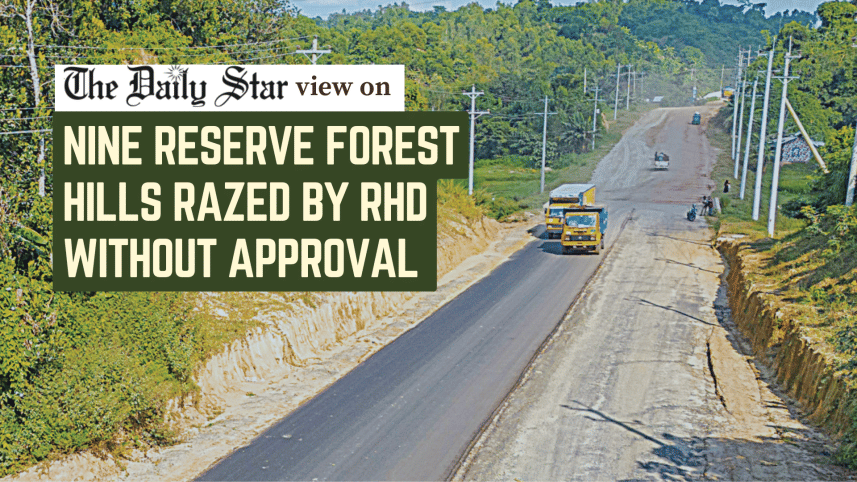Razing of hills in Ctg and elsewhere must stop

Recent media reports have revealed how illegal razing of hills continues unabated across the country, stripping it of its natural defences and ecological balance. Despite clear legal prohibitions under Sections 6(a) and 6(b) of the Bangladesh Environment Conservation Act, 1995, state agencies and private actors alike are destroying hills, often without clearance from the authorities and in full public view. A recent report by this daily revealed that the Roads and Highways Department (RHD) flattened nine hills and removed over 10.14 lakh cubic feet of soil in the Ramgarh-Sitakunda reserve forest to expand a 38-kilometre road, without obtaining the environmental clearance. By the time the Department of Environment (DoE) intervened, 40 percent of the Tk 1,107 crore project was already complete. The project, occupying 90 acres of reserve forest land, is part of an initiative to facilitate cross-border trade, easing transport of goods from Chattogram port to India via the Ramgarh land port in Khagrachhari. However, it has come at the expense of a forest that shelters more than 120 species of birds and 25 species of mammals.
Similar disregard was found in Cox's Bazar's Ukhiya, where the Local Government Engineering Department (LGED) allegedly razed several hills for roadwork, and in Bandarban, where hill cutting near a primary school endangered students and residents alike. Furthermore, the private sector's role in environmental degradation is no less alarming. A Prothom Alo report found rampant hill cutting across Sylhet, with 45 percent of the district's hills now fully or partially razed. The surge is linked to administrative inaction following the political transition of August 2024, when local enforcement effectively collapsed. Another report detailed how Chattogram's Ruposhi Hill was cut and divided into plots, sold for up to Tk 30 lakh per katha.
Such activities have caused severe soil erosion, loss of biodiversity, disrupted rainfall patterns, and frequent landslides that have claimed at least 15 lives since 2022. Meanwhile, local politicians and influential businessmen, shielded by bureaucratic loopholes and shifting land classifications, have turned hill cutting into a profitable enterprise. This crisis reflects not just environmental degradation but a deep nexus of power, profit, and impunity. Without strong political will and accountability, mere legal provisions mean little.
The DoE and local administrations must halt all ongoing hill cutting, prosecute violators, and restore damaged sites through reforestation. Land classification loopholes allowing "shankhola" (barren land) misuse must be reformed, and receipt of environmental clearance must be made mandatory and publicly accessible. Bangladesh must treat hill conservation as a national priority. Satellite monitoring, inter-agency coordination, community reporting, and exemplary punishment for offenders are essential. Without enforcement and ecological restoration, the cost of each razed hill will continue to be paid in loss of living beings and the environment.



 For all latest news, follow The Daily Star's Google News channel.
For all latest news, follow The Daily Star's Google News channel. 
Comments